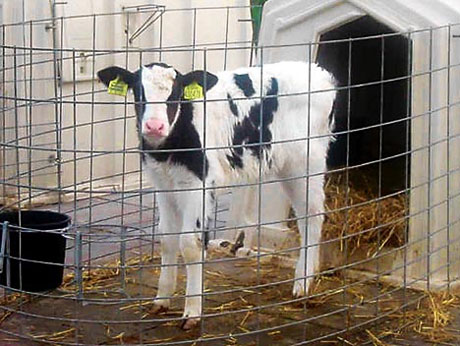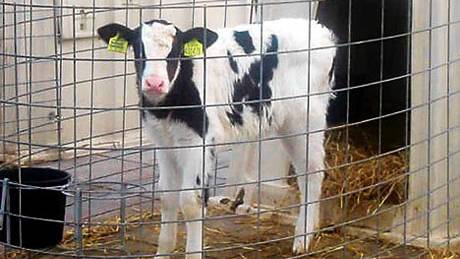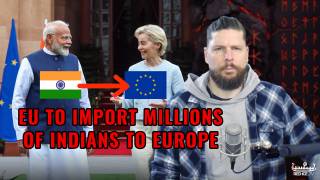EU gives green light for cloned food to go on sale in UK shops
Source: thisislondon.co.uk

In shops near you soon?: This calf of a cloned cow from the U.S was born on a Shropshire farm
EU scientists say meat and milk from cloned farm animals should be cleared for sale.
They admit cloned animals suffer higher rates of early death and disease but say there is no food safety reason to keep their products off shop shelves.
The draft opinion of the European Food Safety Authority will horrify critics who see the development of such animals as "Frankenstein Farming", tampering with nature in a similar way to GM foods.
The authority's support would open the door to clone farming in the UK and the importation of products made from cloned meat and milk in the U.S., where the technique is already used.
The EU report is at odds with the clear desire of consumers for more natural food.
Major supermarkets stressed last night that it is their policy not to stock cloned products.
But they could face an impossible task in identifying them unless the EU insists on a rigorous, costly system of labelling.
This is highly unlikely, as the safety authority's report says there are no safety issues.
The Soil Association, which speaks for organic producers, said it was clear the rush to approve clone farming was being driven by pressure from the U.S. government, keen to boost the profits of the American companies behind the technology.
Association spokesman Gundula Azeez said: "Cloning involves ghastly and invasive techniques.
"The EFSA committee says there is no food safety issue, but how can they know? The research has not been done.
"When you have lots of clones dying at birth or suffering terrible malformations, that should raise serious questions of food safety which need to be understood."
Opponents say allowing clone farming will accelerate the trend towards super-size cows, producing vast quantities of milk, and monster pigs.
The EU began an inquiry into the issue in February last year after the Daily Mail revealed that the offspring of a cloned cow from the U.S. had been born on a Shropshire farm.
Dundee Paradise's mother was created from a cell taken from the ear of a champion Holstein.
The arrival of the calf, unknown to both the government's food and farming department, Defra, and the Food Standards Agency, highlighted serious gaps in the policing of clone farming.
The FSA asked the EFSA to draw up a policy on the practice.
The resulting draft opinion will now go out to public consultation and a final report is expected in May.
EU ministers will be asked to make a final decision later this year, and no individual government will be able to opt out.
The UK government has indicated in the past that it has no objections to clone farming and rejected advice from one of its own expert committees to set up a regime to police it.
But this policy may change as Hilary Benn, the new head of Defra, is a vegetarian who takes the suffering of farm animals particularly seriously.
Concerns about implanting cloned embryos into host mothers come because a significant number are miscarried and others are born with malformed organs.
There is also a problem of "gigantism", with newborns so large they have to be removed by Caesarean section.
Some animals, including the original clone Dolly the Sheep, created by the Roslyn Institute in Scotland, suffer the early onset of crippling arthritis.
The type of cloning used in farm animals is called somatic cell nucleus transfer.
The EFSA admits it is a relatively new technology, "the available data for risk assessment are limited" and there are gaps in knowledge about the welfare of the animals involved.
Yesterday's statement also concedes: "Death and disease rates of clones are significantly higher than in conventionally-reproduced animals.
"The health and welfare of a significant proportion of clones have been found to be adversely affected."
But such concerns are brushed aside with the opinion: "The proportion of unhealthy clones is likely to decrease as the technology improves."
The report suggests unhealthy clones will simply be removed from the food chain, as happens with conventional animals.
Arguing that there is no food safety reason for a ban, the statement adds: "Based on a number of parameters, healthy clones and healthy offspring do not show any significant differences from their conventional counterparts.
"Food products are within the normal range with respect to composition and nutritional value.
"In view of these findings, and assuming that unhealthy clones are removed from entering the food chain, it is very unlikely that any difference exists in terms of food safety between food products originating from clones and their progeny compared with those derived from conventionally bred animals."
Supermarkets - including Tesco, Sainsbury's, Asda, Morrisons and Marks & Spencer - made clear they do not want to stock cloned foods.
M&S said: "We have long had a ban on all genetically-modified ingredients.
"That will extend to produce derived from clones and their offspring."
Tesco said: "We would not stock any products derived from cloned animals or their offspring."
Others adopted the same line, with Asda saying: "We have adopted a policy not to stock meat, milk or anything else from clones or their offspring."
But a lack of labelling rules would make such policies virtually impossible to enforce.
Peter Stevenson, chief policy advisor at Compassion in World Farming-He said they were particularly alarming in a week when the public has been given a graphic insight into the reality of intensive factory farming, through TV reports on the rearing of battery chickens.
Mr Stevenson said: "The only point of cloning is to produce fastergrowing chickens and pigs and higher-yielding dairy cows.
"You have to look at the suffering caused and the kind of animals we are creating.
"Going down the road of cloning would lead to greater industrialisation of farm animal production, which would be a disaster.
"We would urge the EU and the British government to step back from any support for clone farming."
Article from: http://www.thisislondon.co.uk/news/article-
23432051-details/EU%20gives%20green%20light%20for%20cloned%
20food%20to%20go%20on%20sale%20in%20UK%20shops/article.do






















